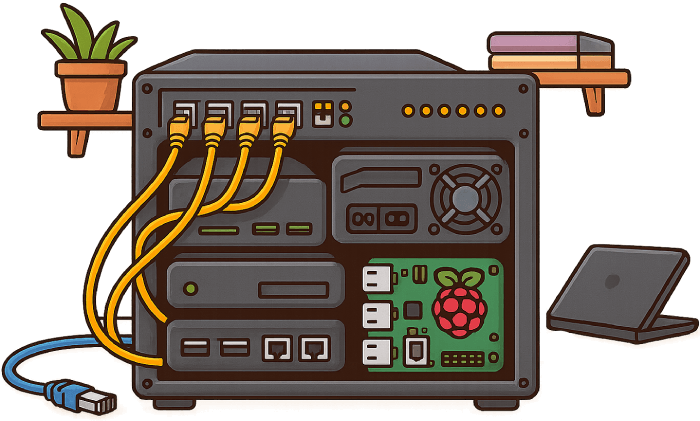Building a "Mini Data Center" with K3S

1. Hardware Setup
🛠️ Physical Infrastructure
- 📦 Server Rack
- 🍓 Raspberry Pi Cluster
- 💻 Mini PCs
- 🔌 Power Management
2. Network Setup
🌐 Network Infrastructure
- 📡 Mikrotik Router
- 🔄 Managed Switch
- 🔒 VLANs & Security
- 🌍 DNS & Load Balancing
3. K3s Setup
☸️ Kubernetes Layer
- 🎮 Control Plane
- 👷 Worker Nodes
- 💾 Storage (Longhorn)
- 🔍 Monitoring
4. Applications & Services
🚀 Applications & Services
- 🗄️ Databases - PostgreSQL, Redis
- 🚪 Ingress - Traefik
- 📊 Monitoring - Prometheus, Grafana
- 🚀 Apps - Your Services
Welcome! I'm glad you're here. Hail to the SEO overlords!
If we haven't met yet, my name is Alexander. I've been in IT for over 20 years and professionally active since 2007. Over the years, I've worked as a CISCO engineer, a senior full-stack developer, a startup co-founder, and, for the past few years, a team and tech lead. You can check out my LinkedIn profile if you want to know more about my background.
I think it's important to share a bit about myself so you can decide if I'm the right person to guide you.
I hope this guide to building a home "mini data center", from hardware and networking to K3s and real workloads is helpful. If you have any questions or suggestions, feel free to reach out on GitHub or join me on one of my live streams.
Now, let's get started.
With so much information available today, it's worth asking yourself, "Why am I building this?" or "Why am I learning these skills?"
Why choose this project, setting up your own infrastructure, networking, and orchestration, when there are so many other things you could focus on? How will it help your career? Will it solve any real problems you're facing, or are you just doing it because it seems popular or trendy? These are the kinds of questions you should think about before committing to something new.
Many of you might know me from Twitch or YouTube. I prefer to keep things practical and honest. I'm not a fan of the influencer mindset where people recommend things just to fit their content strategy, especially when they don't actually use the tools or techniques they're promoting.
So, when someone asks, "Why should I build a home lab or learn Kubernetes?", it's a valid question. I could give you plenty of reasons, but not all of them might matter to you. Maybe this isn't the right time for you to dive into this. Maybe there are other skills that would be more useful for where you are in your career right now.
It's important to understand the difference between things that are interesting to explore and things that are genuinely valuable to learn. Everyone has different needs depending on their goals, so take the time to think about whether this journey is what you need at this moment.